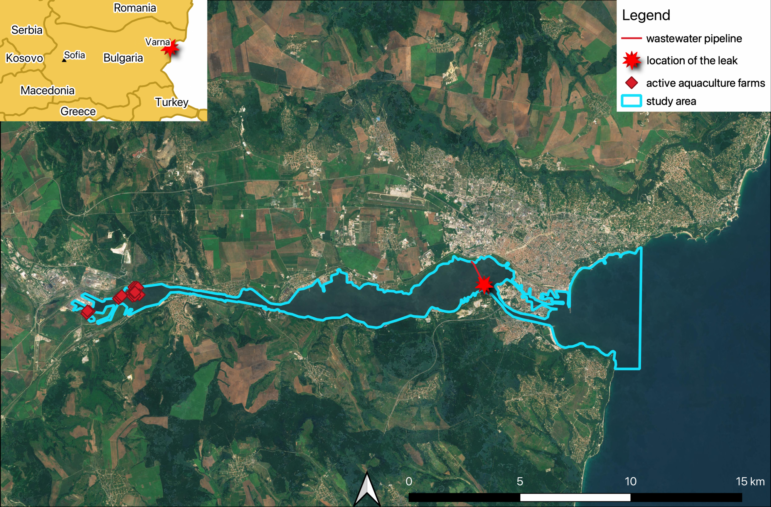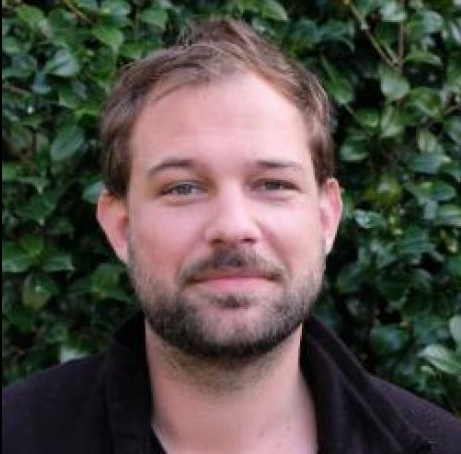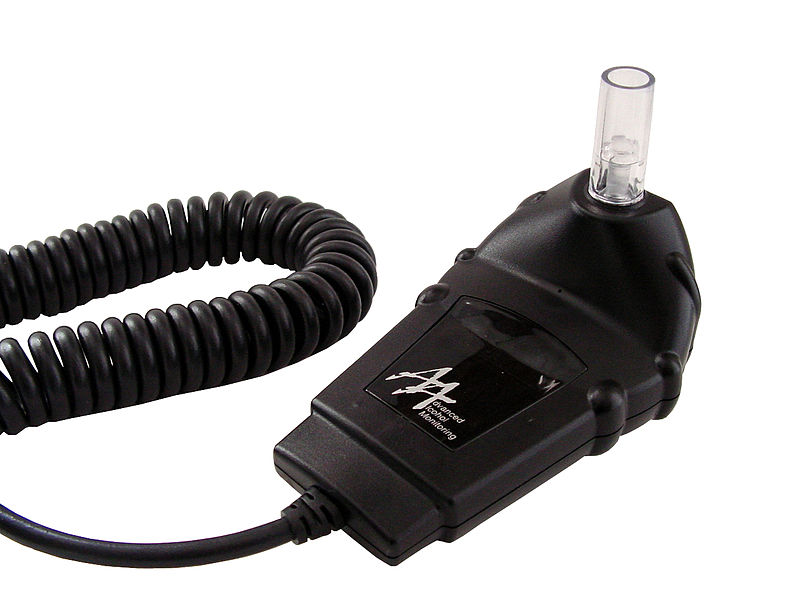
EIF’s 2022 investigation into wastewater leaks into Lake Varna, Bulgaria, combined remote sensing tools and on-the-ground verification to document the cause of harmful algae blooms and dead zones. Image: Screenshot, Christina Anna Orieschnig, Earth Journalism Network
The Environmental Investigative Forum wears many hats.
EIF is currently developing its first open source tool for tracking mining activities in 23 African countries.A France-based nonprofit founded in 2020, EIF has coordinated cross-border reporting teams to use satellite data and field reporting to investigate wastewater spills in Bulgaria. The organization has trained journalists in West Africa to track mining activity. It has built an international network of more than 100 investigative journalists and environmental experts, connecting them to each other and to opportunities to probe activities shaping the natural world.
This spring, the young nonprofit took another step toward its goal of becoming a hub that supports innovative environmental investigative work around the world. EIF restructured itself to create an advisory board made up of representatives from six regional journalistic organizations on four continents. With this new committee, EIF is beginning a process to assess the needs of environmental investigative journalists worldwide and set long-term goals to develop resources and tools to support them.
“The aim is to make it a truly global network,” says Alexandre Brutelle, EIF’s co-founder and director.

Environmental Investigative Forum director and co-founder Alexandre Brutelle. Image: Screenshot
African organizations Oxpeckers, Norbert Zongo Cell for Investigative Journalism in West Africa (CENOZO), and InfoNile have joined EIF’s advisory board, so have The Third Pole, which is focused on the Himalayan watershed, MENA’s Arab Reporters for Investigative Journalism (ARIJ), and the Society of Environmental Journalists (SEJ) in North America.
The establishment of the advisory board builds on EIF’s efforts to forge relationships with journalists and organizations that span the Global South and North to foster transnational environmental investigative work.
EIF’s activities break down into three main categories, according to Brutelle. First, the organization facilitates investigations by connecting journalists and technical specialists in different regions. Often probing the local impacts of industries and companies that operate globally, teams under EIF’s umbrella have employed remote sensing to gather information for stories, using techniques like monitoring radiation, satellite imagery, and other datasets. For example, EIF’s 2022 investigation into a European petrochemical company’s gas flaring in a Democratic Republic of Congo mangrove area was published in English by Investigate Europe and Disclose — and, in French, by Enviro News.
Second, EIF supports members and partner organizations to undertake investigative work by offering training, technical advice, and consulting.
Creating resources for environmental investigative journalism is EIF’s third pillar. The organization tries to make reporting methodologies replicable. EIF is also currently developing its first open source tool for tracking mining activities in 23 African countries, expected to be released later in 2023.

An EIF networking and training session, held at the 2022 African Investigative Journalism Conference, with CENOZO and Oxpeckers. Image: Courtesy of EIF
While EIF’s global connections are growing, the organization is still young. The budget in 2022 totaled just shy of €34,000 (US$37,500). According to Brutelle, much of the group’s funding comes from grants related to specific investigative projects and organizations, including Journalismfund Europe, the Pulitzer Center, and Internews. Another main source of last year’s revenue was payment for training and consulting from journalism schools, media support organizations and newsrooms, and some small, self-funded contributions from EIF’s co-founders. EIF has no donors that support ongoing operations, though Brutelle says securing such funding is a priority.
Brutelle, EIF’s only contract employee, works part-time as director. EIF’s team has included five other people, a mixture of representatives from geographic regions and technical experts, who have worked either on specific, grant-funded projects or donated their time to consult on ideas in development, according to Brutelle. After EIF’s restructuring, the core team will include people with technical expertise, who can help develop projects that involve more complex approaches like remote sensing, as well as representatives of regional organizations on the board.
Building on Collaborative Environmental Journalism
In regions around the world, organizations are using powerful strategies to dig into environmental issues, Brutelle says. However, journalists in different parts of the world that report on similar topics and face similar challenges may not be aware of how their peers are working on parallel issues. That’s where EIF hopes to come in.
“The nature of environmental issues is that they’re inherently both local and global.” —Anton Harber, veteran South African journalist“We offer to unite and to make a coalition of all these initiatives, so they have space to reflect and to exchange the methodology they are using,” Brutelle explains.
Cross-border collaboration is increasingly common in investigative journalism on environmental issues, notes veteran South African journalist and Wits University professor Anton Harber, who was also a longtime member of GIJN’s board. Among other roles, Harber was the longtime convenor of the Africa Investigative Journalism Conference, where collaborative environmental work has been a major focus.
“The nature of environmental issues is that they’re inherently both local and global,” Harber says. “So while many of the stories are rooted locally, they often have global parallels, connections, reverberations, that cross borders.”
While there are regional centers for environmental journalism and Global North-South projects, Harber says he is not aware of any ongoing global hub that serves as a conduit for journalists focused on environmental reporting — though there are similar initiatives in organized crime.

EIF partnered with Parametric Press to study changes in the Mekong River delta, using satellite imagery to compare flooding in wet versus dry seasons. Image: Screenshot, Parametric Press
That type of collaborative organization can offer many benefits for environmental investigative work, according to Harber. Not only can a hub help journalists share knowledge across geographic regions, it can be an opportunity to exchange skills and techniques. An international alliance can also protect journalists, Harber says. If one reporter encounters threats, there’s a network that will notice, rally around them, and pick up the story.
Members of EIF’s newly formed advisory board echo the benefits of increased communication among environmental investigative journalists around the globe. Fiona Macleod of Oxpeckers sees joining EIF’s board as an opportunity for the South Africa-based organization, which has a track record of regional environmental projects incorporating mapping and geo-data journalism, to share its expertise. “We hope it will help us to expand the support, and access to the tools and techniques that environmental journalists need to do their work,” she explains.
By working together, environmental journalists can amplify each other’s work, says Aron White of The Third Pole. “The more we can highlight this broader relevance in our reporting, drawing out why something that happens in the Himalayas might be important to understand in the Andes,” White says, “the better chance we have of our work catching people’s attention and having an impact.”
Opportunity in Collaboration
Another member of EIF’s new advisory board, CENOZO, started partnering with EIF after its coordinator Arnaud Ouedraogo met Brutelle through his other work with the Civil Forum for Asset Forfeiture (or CiFAR).
Initially focused on corruption, governance, and organized crime when it was founded in 2015, CENOZO has since expanded to cover environmental and climate issues, which are pressing in West Africa, according to Ouedraogo.
“Together we are stronger and together we can have global impact.” — CENOZO coordinator Arnaud OuedraogoWhen CENOZO participated in the Center for Investigative Journalism’s Open Climate Reporting Initiative, the organization had some funding for training and mentorship. CENOZO contacted EIF, and Brutelle trained West African journalists on using open source tools, mapping techniques, and climate data journalism for environmental investigations. Stories resulting from the project probed the impacts of mining activities on protected natural areas.
Ouedraogo says joining EIF’s board made sense for CENOZO because it offers the chance to learn from other regions about techniques in environmental reporting. Though its relationship with EIF is still new, he is optimistic this structure could lead to more collaborative projects. Ouedraogo believes there is opportunity for similar collaborative projects on environmental issues, similar to how his group’s partnership with the International Consortium of Investigative Journalists led to big stories like the West Africa Leaks, Pandora Papers, and FinCEN Files
“Together we are stronger and together we can have global impact,” Ouedraogo says.
While EIF is far from the only international journalistic organization focused on the environment, Ouedraogo says EIF’s consortium stands out because its members include both journalists and environmental experts. “This is the particularity of EIF,” he explains. “I think that journalist organizations and journalists need to have strong collaboration with experts.”
New Environmental Reporting Techniques
EIF’s emphasis on pairing data with local reporting is key to more rigorous reporting, says EIF researcher Christina OrieschnigChristina Orieschnig is one of those experts on EIF’s team. A researcher at France’s University of Montpellier in hydrology and earth observation, Orieschnig has explored opportunities for using remote sensing in EIF’s investigations.
For instance, her 2022 investigation of wastewater spills into a Bulgarian lake, was able to show higher levels of eutrophication — harmful algae blooms and dead zones — around the time that the these leaks occurred. Orieschnig says she drew upon datasets from NASA and the European Space Agency, looking at the temporal dynamics and the spectral properties of the water. An additional set of data collected by scientists on the ground helped her verify her results.
EIF has used remote sensing in three other published investigations — on a European petrochemical company’s activities in Tunisia as well as in the DRC, and recently on the impact on wildlife from a Tanazanian dam project — and others are in development. While Orieschnig sees great potential for remote sensing in environmental reporting, she says there are limitations, depending on available data and the question reporters want to answer. EIF’s emphasis on pairing data with local reporting is key to more rigorous reporting, she says.
“No matter how good the remote sensing analysis you can do, no matter how high-resolution your imagery,” she explains, “having local people, local knowledge, people on the ground who actually have an understanding of how a certain system works — it’s indispensable for actually getting good results.”
As EIF looks to the future with an expanded board to directors, Brutelle says the young organization’s goals are to attract more new members and unite similarly focused journalists across the globe.
“We hope that EIF becomes a shared subject, a shared responsibility, by as many regional journalism hubs as we can as we can find,” Brutelle says.
Additional Resources
Supercharge your Environmental Investigative Stories with Data and Visuals
Environmental Investigative Reporting: Resources & Methods
Remote Sensing and Data Tools for Environmental Investigations
 Elizabeth Hewitt is a reporter and editor based in the Netherlands, reporting on topics including aging, nature, and culture. She’s a former editor and reporter for the Vermont nonprofit news site VTDigger.org.
Elizabeth Hewitt is a reporter and editor based in the Netherlands, reporting on topics including aging, nature, and culture. She’s a former editor and reporter for the Vermont nonprofit news site VTDigger.org.
The post France-Based Environmental Investigative Forum Is Taking Cross-Border Collaboration to the Next Level appeared first on Global Investigative Journalism Network.

 1 year ago
137
1 year ago
137


